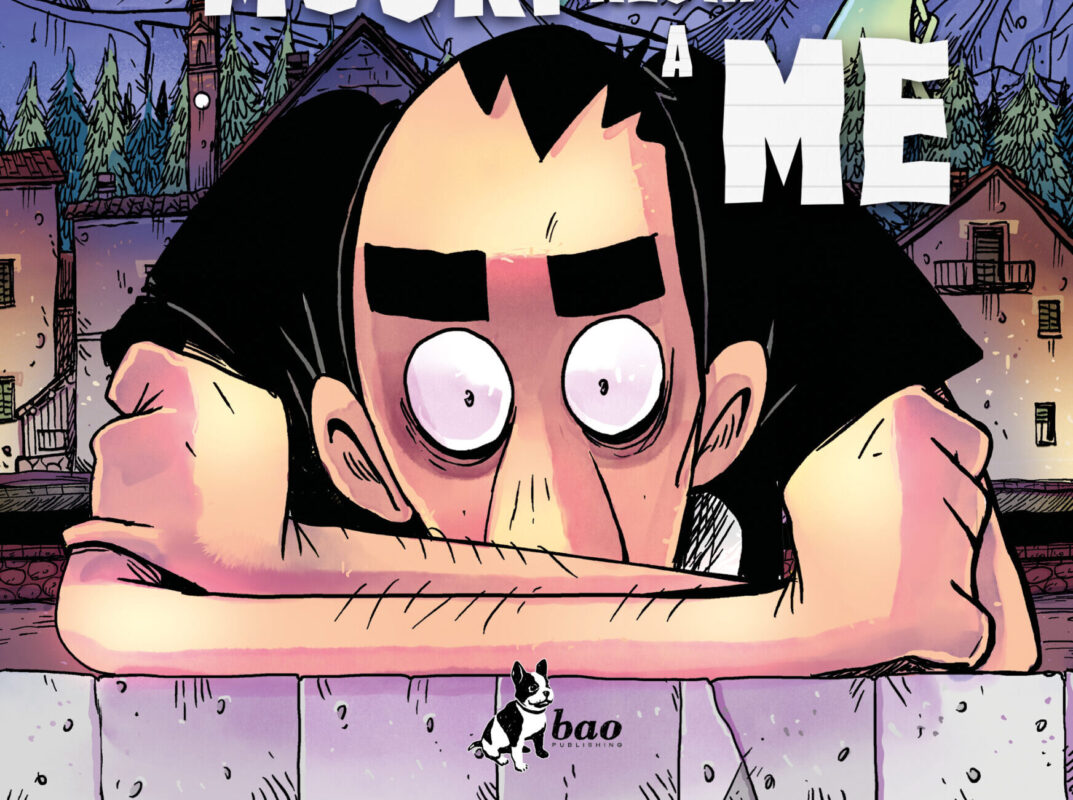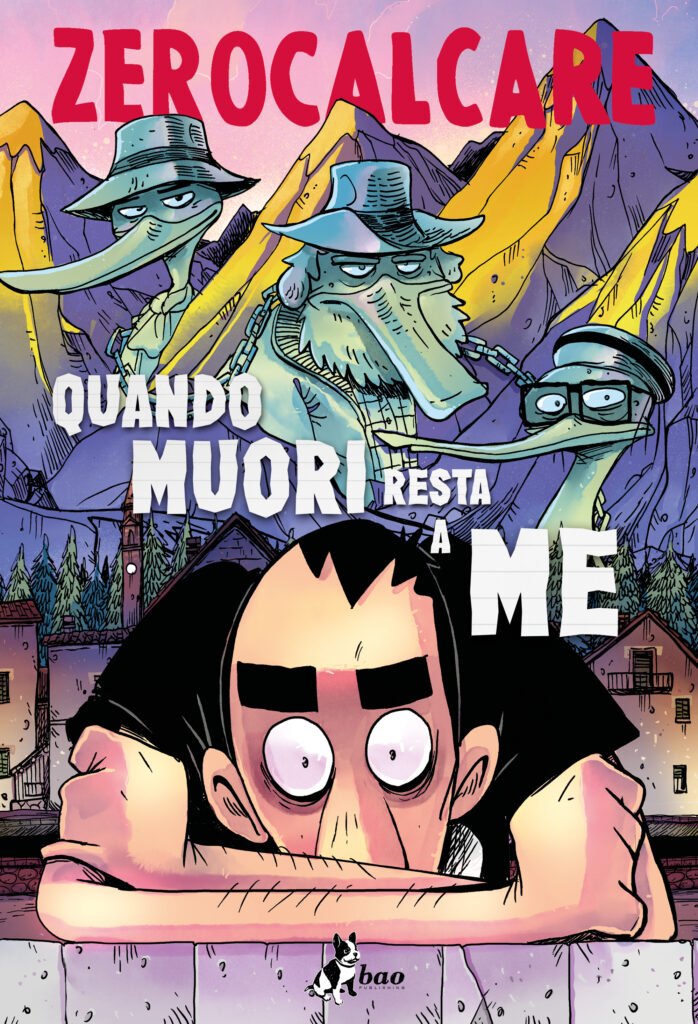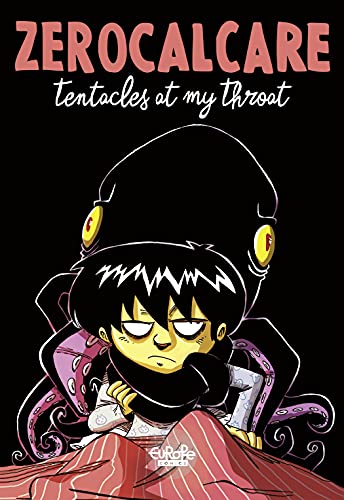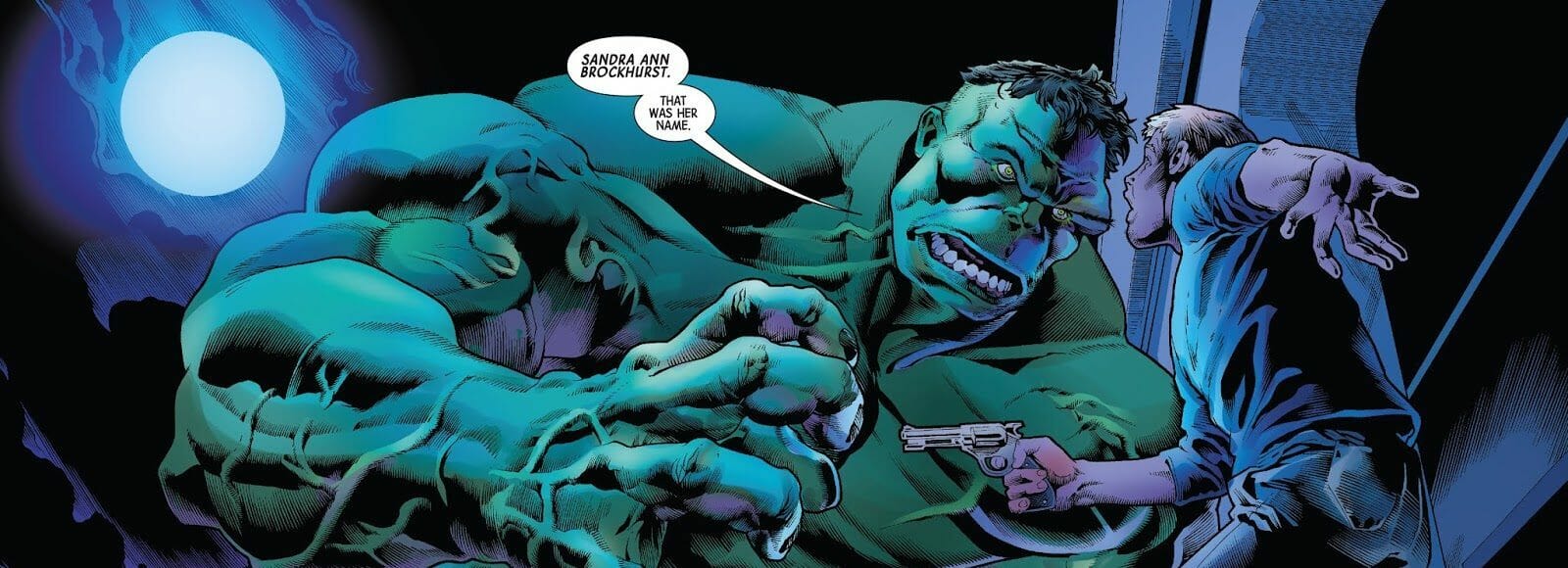
Quando muori resta a me | Zerocalcare’s take on fathers, sons and masculinity
Author
Year
Format
Length
For daughters and sons, dealing with what they feel about their parents is always a messy business: the mixed-up feelings, the generation gap, the inevitable squabbles. Zerocalcare delves deep into this theme with his new book Quando muori resta a me (meaning ‘when you die stick with me’) though yet to be translated into English, focusing on the relationship with his father. For the author, doing a trip together with his dad is not only an occasion to explore how they relate to each other, but also a further chance to question himself and the person he thinks he is.
Up on a mountain with no internet
Explicitly divided in a three acts structure, the book follows a three-folded narrative: the present, when Zerocalcare and his father go to his paternal grandfather’s house in Merìn, in the Venetian area; Zerocalcare’s past, from his childhood, when his parents broke up, to several events of his adolescence and youth which put together the story of his father-son relationship; and the story of Zerocalcare’s great-grandfather who lived in Merìn, starting from 1909.

Most of the story, however, focuses on the present, when the author has a chance to spend time with his father but also to take a break from everybody and everything since the internet connection is not very reliable up in Merìn. Not that Zerocalcare is happy about these two things. On one hand he notices more than ever how flat and scarce is the communication with his father and, on the other, how much he struggles to distract himself in many ways from deeper thoughts and issues that haunt him, like the future or death.
The plot unfolds as the author tries to understand what happened the day his parents broke up and how his father dealt with it. In doing so, all the storylines revolve around the same matter: the lack of communication, with oneself not less than with others. A lack of communication that, worst case scenario, can lead to incomprehension and hate, as the reader finds out during the story involving Zerocalcare’s great-grandfather.
Zerocalcare, his father and the muddy field of the unspoken
Readers got to know Zerocalcare’s mother much better, since she is much more present in his comics. Plus, she’s also one of the main characters of Forget My Name, one of his most successful comic books, which explores the theme of death while looking into the past of his mother’s family. Quando muori resta a me fills the gap of the male branches of the family tree.
The inspiration, says Zerocalcare, came firstly after watching Aftersun, since the focus of the movie is the relationship between a father and his daughter. Thus he realized it was time to put into words and drawings the relationship with his father, mostly confined to the borders of a few topics, like sports and getting help to fix the boiler. The matter is quite simple: his father and he are not used to communicate their feelings, like a wide range of the male population. However, Zerocalcare doesn’t sugarcoat the issue into a reconciliation story where they finally learn to communicate. The emotional distance cannot vanish after a lifetime of unspoken feelings. Using his usual mix of irony, pop culture and sensitivity, the author puts together a story where the point is not solving issues, but to not run away from them and to try to understand their source.
There’s room for a hint of optimism too, though. The choice to narrate several generations of his father’s family is Zerocalcare’s way to acknowledge that something changed over time, even if extremely slowly. And that understanding why communicating is so hard can be a way to smooth the process for further relationships. An important step to build a new kind of emotional communication between males, as it happens in My Hero Academia within the storyline of the Todoroki family.
Author, character, person: who is Zerocalcare?
Away from the relentless chaos of the internet and everyday life, Zerocalcare has a chance to look inside himself too. Like in other graphic novels of his, he always feels stuck while others go on with their life. Here the issue links with the theme of fatherhood since Zerocalcare wonders if he will ever be able to become a father and how he will handle the relationship with a son or a daughter. Further victim of a patriarchal model, he almost feels like procreating is one of the mandatory elements to become a proper adult.
Moreover, the idea of becoming a father connects with the wider theme of growing up and assuming responsibility for one’s actions. At the center of the story there’s also the theme of how a person perceives themselves and how others perceive them. Here Zerocalare questions himself directly on how he chooses to represent himself as a character: one way or another, he keeps on depicting himself like an eternal teenager, at least partially, always bound to his parents’ help when he has to face issues, from minor to major ones. In the end, the point is to understand if this is actually true or if he wants to represent himself like this because he’s scared of defining himself as an adult. A question expressed in one of the most dense scenes of the story, where his cartoon-self looks into the mirror a realistically depicted version of himself.
How Zerocalcare sketched the relationship with his father
Like always, Zerocalcare represents feelings and states of mind as actual characters, like the sense of guilt or the gnomes building the wall of incommunicability with his father. Like it already happened in Macerie Prime, the renowned Armadillo isn’t very much there for the better part of the story, maybe in an attempt by the author to deal with his issues without talking his way out of them ironically. Similarly to Tentacles at my throat, the narrative always stays focused on the plot without using the usual mix of story and comic strips, which sometimes wander off the main path.

Zerocalcare gives center stage to the tangle of incommunicability and unspoken emotions between his father and him, which takes the shape of Mer-Man, one of He-Man’s enemies. And conveys the harshness of confronting the themes at hand also with some horror-like, scenes, from the representation of a nightmare to the final battle with a long unspoken issue.
And now what, Zerocalcare?
Now 40 years old, Zerocalcare seems to have reached a turning point. He has many publishing successes and two acclaimed Netflix animated tv-shows under his belt. Always bouncing from graphic journalism, like his last work on Ilaria Salis’ trial, to more intimate stories, with Quando muori resta a me one could say he closed a first, big chapter of his work. He wrote stories about his past, about his family, about his social and cultural commitment. And in this last graphic novel Zerocalcare questioned himself, among other things, about the image he gives of himself in his works: as a person, as an author, as a character. All of this considered, the reader is left to wonder which path will take the comic artist of Rebibbia from now on.
Tag
Buy a ☕ for Hypercritic








